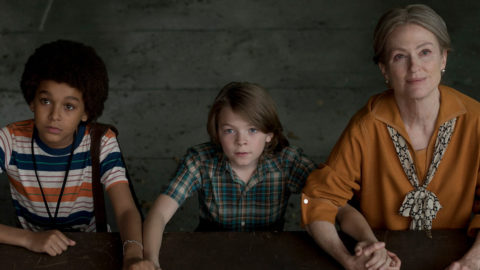Film of the Week: Rocketman
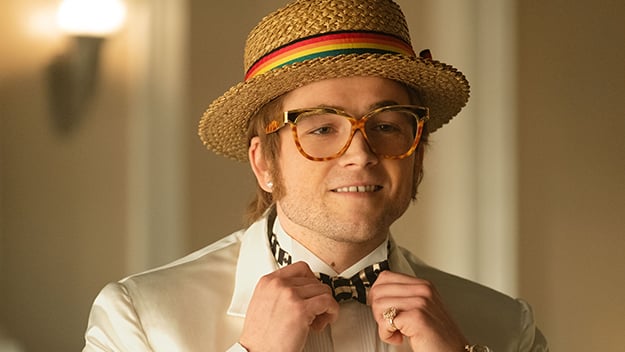
Images from Rocketman (Dexter Fletcher, 2019)
There used to be a children’s show on British TV called Crackerjack!. It featured games (winners in the studio would win a much-prized Crackerjack! pencil), audience participation (whenever anyone mentioned the show’s title, everyone had to shout out “Crackerjack!”), and a weekly comedy sketch in which characters would intermittently burst into song, singing whichever current pop hits had arbitrarily been shoehorned into the script. The show began in 1955, so Reginald Dwight, born in the London suburb of Pinner in 1947, would have been more than familiar with it as a child. In fact, Dwight—now known as Elton John—has now essentially taken the Crackerjack! musical-sketch format and turned it into his own cinematic testament, in the form of bouncy biopic Rocketman.
Executive-produced by the film’s own subject, with his husband David Furnish among the producers, Rocketman is scripted by Billy Elliot writer Lee Hall and directed by Dexter Fletcher. He limbered up for the film by stepping into Bryan Singer’s shoes to complete Bohemian Rhapsody; there are inevitably echoes here of that other ’70s lonely-at-the-top biopic of a tortured soul grappling with the grief of success and solitude. Rocketman is also, of course, a close relation to Mamma Mia! and all those repertoire-rifling jukebox musicals that now rule the world’s theater stages. But I can’t help thinking of Crackerjack! simply because Rocketman is so proudly cheap and cheerful, as we say in the U.K. (despite its healthily budgeted visual flamboyance); and because it feels exactly like the sort of fantasy about pop stardom that an 8-year-old boy like young Master Dwight might have entertained in more innocent times. In fact, that’s rather how the film is pitched: Reg as a boy (Matthew Illesley; Kit Connor takes over when he hits adolescence) is sometimes seen as a figment of Elton John’s imagination, but it’s also as if Elton (Taron Egerton) is a larger-than-life creation of the mind of young Reg. Who’s dreaming whom? Rest assured, all mental rifts are successfully healed at the end of the film when man and boy confront each other and find closure: nothing makes a biopic feel so much like a self-help manual in disguise as when its subject literally hugs his inner child.
Rocketman is much more successful on its own terms than Bohemian Rhapsody, although that’s perhaps why it’s not quite as much fun: the particular pleasure of that film was in watching it founder dramatically, clumping along in its glittery seven-league boots, while Rami Malek’s dazzling Freddie Mercury flew above the debris with angelic comic lightness. Rocketman is a much more cannily honed machine, absolutely sure of its purpose, so you rather feel you’ve been sold a complete deluxe package, as you might in a flawlessly staged Broadway or West End show: at times, consumer satisfaction is taken care of a little too aggressively for you to really feel involved.
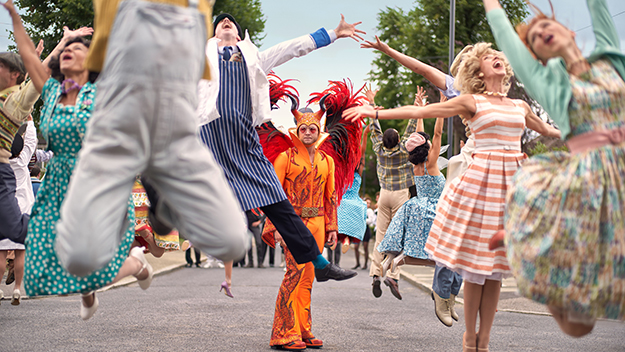
Where Bohemian Rhapsody adopted a straight linear format, Rocketman fictionalizes, not to say mythifies the facts, turning everything in John’s life into preposterous, absurd, big-as-his-wigs pantomime. It’s that invention and showmanship that make the film so enjoyable, in a disposable, sometimes crashingly obvious way. The film is presented unashamedly as an extended therapy session: it begins with Elton stomping toward the camera wearing a spangly orange devil costume (horns, vast wings, and all) and flopping himself down in an Alcoholics Anonymous meeting. He proceeds to spill his soul, under the rueful eye of his child self, who materializes in the room on the line “I was justified when I was 5,” from 1974 hit “The Bitch Is Back” (the film is clever with these song/story connections: that’s the Crackerjack! touch).
Cue a brisk dance routine, taking Orange Devil Elton into the black-and-white surroundings of his street in Pinner, while a chorus of suburbanites spin around him. It’s one of several sequences where Rocketman (shot by George Richmond, choreographed by Adam Murray) captures a dash of MGM musical brio; an even better one is a clever tracking shot that leads us into an exuberant fairground knees-up version of “Saturday Night’s Alright for Fighting” (“I’m a juvenile product of the working class!”). In this sequence, Fletcher’s directing style owes a lot to Julien Temple’s then-disparaged, now fondly remembered Absolute Beginners (1986); there’s a bit of All That Jazz in places; a dash of Steven Soderbergh’s Liberace movie Behind the Candelabra (there’s a brief shot of “Lee,” the Ur-Elton, on TV); and music videos from several decades, Elton’s included. But Fletcher uses these borrowings with the same eclectic cheerfulness and modesty with which John—as much a musical fan and bricoleur as David Bowie—forged his own style, so no shame there.
Rocketman hits a mawkish patch early on, as young Reg strives hard to impress or win love from his parents, despite his precocious ability to pick out the “Blue Danube Waltz” by ear on the parlor upright. Father Stanley (Steven Mackintosh) is dour and distant, and won’t let Reg touch his prized jazz records; vampish mother Sheila (Bryce Dallas Howard, here plumply transformed into a dead ringer for Gemma Arterton) sits in the kitchen grandly bored; only grandma Ivy (an underused Gemma Jones) provides encouragement and tenderness. The film’s one truly teeth-grinding moment comes when the family members sing the 2001 John-Taupin ballad “I Want Love” to far too neatly diagnostic effect (“Don’t feel nothing, I just feel cold,” chants glum Dad).
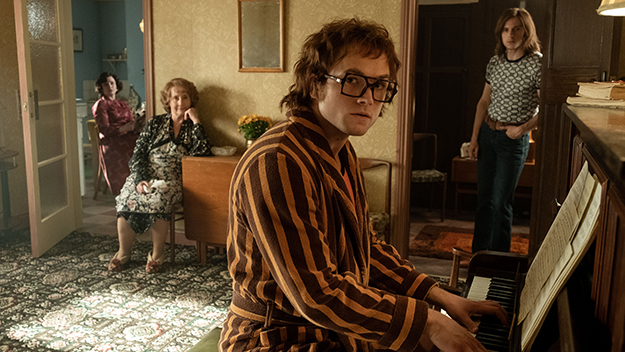
The film’s running theme is the improbability of introverted, under-confident wallflower Reg growing up to be an attention-hungry super-peacock, but the film shows what a slow transition this was. As backing pianist on a late ’60s soul tour, Reg gets his first kiss from a male singer; in Denmark Street (“Tin Pan Alley,” the erstwhile hub of London’s music business), he gets a rough reception from boisterously ill-tempered impresario Dick James (a nice comic turn by Stephen Graham); but finally hits it off in a shy bromantic cute meet with lyricist Bernie Taupin (Jamie Bell), who hands him his words for “Border Song” in a brown envelope… The rest is history, written in rhinestone.
The film is rather engagingly coy about the duo’s friendship, which might have been a love story except that, as Bernie says, “I love you, man, I do—but not in that way.” There’s a poignant moment, though, when the pair attends a party after the singer’s triumphant U.S. debut at L.A.’s Troubadour; instead of hanging out with Elton all evening, Bernie drifts off with a young woman, leaving his friend to mooch around singing “Tiny Dancer” (the most lachrymose and most narcissistically music-biz number in their songbook). That evening, though, Elton is approached by smooth-suited John Reid (played in Bohemian Rhapsody by Aidan Gillen, here with even more purring malice by Richard Madden), who becomes his lover, his manager, and his adversary in a toxic relationship.
The film’s main success-and-sorrow story extends over a limited period—roughly from 1970 and conquering America to 1983, when John pulls himself out of his trough, as signaled by an accurate re-creation of the Cannes-shot video for “I’m Still Standing” (ironically, the hits get really scarce from then on—as long as you don’t count the corporate anthems of The Lion King). Given the limited time span, the story races along at a demonic clip trying to fit it all in: we have to believe that Elton conquered the U.S. decisively during the very first song of his very first American date. From there, it’s just a blink away to the spinning front-page headlines that announce he’s now a multimillionaire (some footage of him slogging away at sports hall dates in Detroit and Des Moines might have made this more credible, but who has time?). The neatest example of this elision is in the rushed-through episodes of his private life in which a confused John got together with women: a posh-bohemian London landlady named Arabella, who leers at him when he arrives, then throws out his stuff when he announces he’s gay; and his brief marriage to sound engineer Renate Blauel, only too soon destined to gaze at him over a desolate Citizen Kane breakfast.
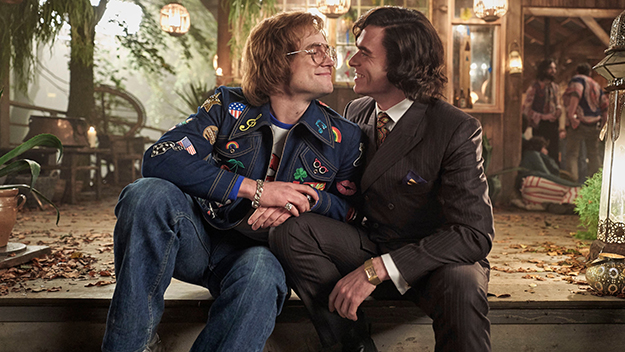
The one blaze of emotional or erotic pleasure John is allowed is in his initial tumble with Reid, but later when he’s seen in the midst of a gay bacchanalia, a close-up shows him looking worried, as if asking himself where love truly lies. The film goes out of its way to be more truthful and upfront about its subject’s gayness than Bohemian Rhapsody, which struggled with its fundamental embarrassment about Freddie Mercury. But there’s still an enduring mistrust of hedonism here. It’s as if John’s former wild lifestyle has to be offset by the corrective message of the end titles, which point out that he’s now happily married to David Furnish, and a proud father and philanthropist—although (just a homeopathic dash of enduring naughtiness) he still has a shopping problem.
Taron Egerton doesn’t have to do a rescue job as Malek did on Bohemian Rhapsody—here the show very nicely takes care of itself, thanks very much. But he does a terrific, ebullient job, proving an ebullient, up-for-anything song-and-dance man. He gets John’s vocal mannerisms dead right, including the flat northwest London speech patterns, and comes across with the brash, likable eagerness of an understudy in a stage musical, suddenly shoved into the spotlight for one performance only and determined to make it a night to remember. A round, wonderstruck face gives him the look of an unkempt, unshaven Care Bear, and when he’s wearing John’s ridiculous outfits, he looks like a man being devoured by his own costumes, which is exactly how it should be. And he can actually emote while wearing an outsize feathered fez: if that isn’t acting, I don’t know what is.
The end titles juxtapose a number of images from the film with original pictures of Elton John to show you that everything was true: he really did levitate at the keyboard! He really dresses up as a glam rock version of Foghorn Leghorn! But I don’t think anyone watching Rocketman will particularly care whether much of this is true or not. This is a film that sells the myth, covers it up in shiny festive gift wrap, and ties up the package with a gently affirmative to-thine-own-self-be-true message. It’s bogus but it’s boisterous, and it knows exactly what its public wants—very true to Elton John, then, and who can argue with that?
Jonathan Romney is a contributing editor to Film Comment and writes its Film of the Week column. He is a member of the London Film Critics Circle.




